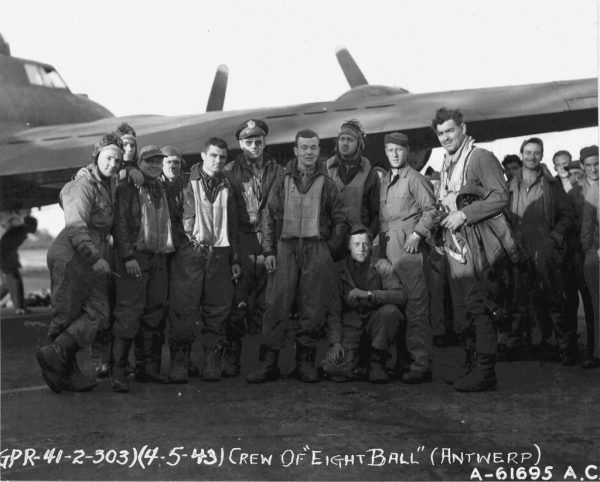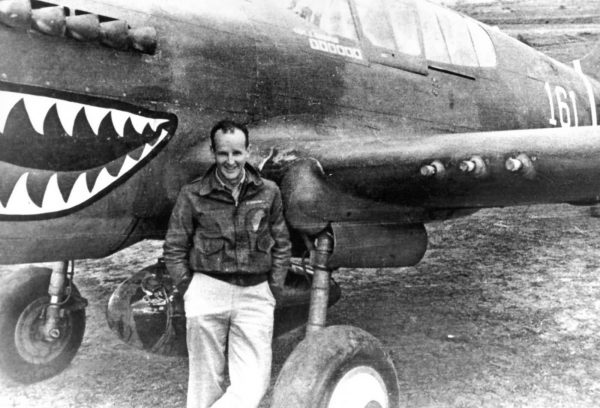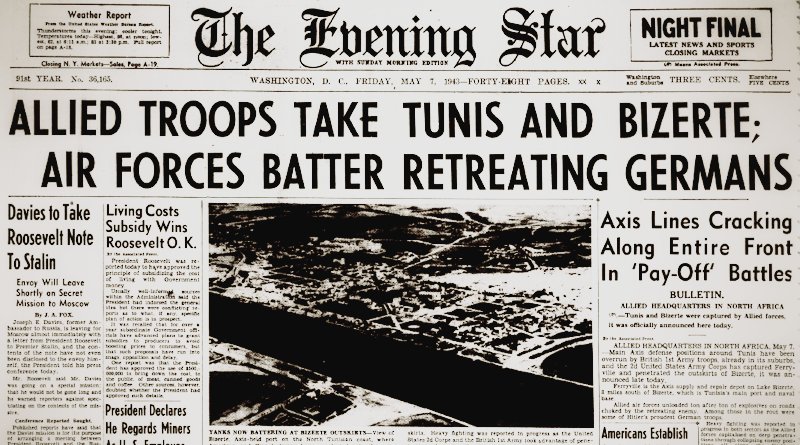World War II Chronicle: May 7, 1943
Click here for TODAY’S NEWSPAPER
Howard W. Gilmore, the late skipper of the submarine USS Growler, has been posthumously awarded the Medal of Honor. Gilmore ordered his submarine to submerge after ramming an enemy gunboat. He had been wounded by machinegun fire and knew his crew would not have time to bring him below (story begins on the front page). Click here for a short film about Gilmore and Growler…
Page two reports that Capt. Clark Gable has returned safely from his first combat mission. The movie star enlisted in 1942 and trained to become an aerial gunner. He went on to Officers Candidate School and was tasked with making a recruiting film about gunners. The newspaper says the mission was “uneventful,” which had me wondering if they really did send Gable into harm’s way. He was assigned to the 8 Ball Mk II which was part of a 79-plane 1st Bombardment Wing strike on the General Motors and Ford plants in Antwerp, Belgium. Gable’s Fort was the lead bomber, flown by Capt. William R. Calhoun Jr. 16 bombers were damaged, three airmen wounded, and their gunners claimed 10 German fighters shot down and one damaged.

If you’re like me and you’ve found yourself wondering about numbers when it comes to bombing missions: each plane carried five 1,000-lb. bombs, gunners shot over 21,000 .50-cal. rounds, 65 B-17s reached the target and dropped 161.5 tons of bombs, they dropped from 23,500 feet, and the mission lasted four-and-a-half hours. I don’t know who the big name in Hollywood is these days, but I imagine Brad Pitt would generate a lot more publicity for his first taste of combat and not just a brief and very uninteresting mention on page two. Maybe details were purposefully left out so the Germans couldn’t target Gable. Hollywood in the 21st Century is a sick shadow of what it once was, when even the biggest names were putting on the same uniform as the regular Joe…
On page five we learn that both Theodore Roosevelt Jr. and his son Quentin have been awarded the Silver Star. This marks the third time Brig. Gen. Roosevelt has earned the nation’s third-highest decoration for combat valor, and he will soon be presented with a fourth Silver Star… On the same page, Capt. John F. Hampshire Jr. — top American ace in China — has been killed in action. The paper lists 12 victories, but official Air Force records show 13. He was assigned to the 75th “Flying Tigers” Fighter Squadron…

George Fielding Eliot column on page 10… Sports section begins on page 14… The Navy is working on shark-repellent research (see page 21)… The “Torpedo 8” story continues on page 31.
Roving Reporter by Ernie Pyle
IN THE FRONT LINES BEFORE MATEUR — Rest periods for our front-line troops in Tunisia are few and far between. And when they do come they are only for a day or two, and subject to being ended at any moment.
The infantry battalion that I’ve attached myself to had its rest cut short just after dark on the second evening. Word came to move again into the lines, which were only a mile and a half away.
We had been dug in on a high, rocky ridge. German shells pounded continuously on the back side of the ridge, just a hundred yards off. The whole solid mountain seemed to tremble with each blast, but of course it didn’t actually. And we were perfectly safe.
Our view there was beautiful and majestic. Yet I personally was not reluctant to leave. For we had discovered that our ridge was inhabited by a frightening menagerie of snakes, two legged lizards, scorpions, centipedes, overgrown chiggers and man-eating ants.
Our battalion marched in two sections. The first left early, with orders to attack a certain forward hill at 3 a.m. The other half was to start after midnight, reach a certain protected wadi before dawn, dig itself in and stand by for use whenever needed. I went with the second batch.
The men weren’t upset about going into the line again so soon. They just accepted it. They feel they have already done more than their fair share of this war’s fighting, but there is in their manner a touchingly simple compliance with whatever is asked of them.
At 1 a.m. we were ready to go. Blanket rolls and personal gear were left behind. I carried only my mackinaw and small hand shovel.
In columns of two we plowed down a half-mile slope waist high in wild grass. The slope was full of big bomb craters. We had to feel for them with our feet and walk around them. There were big rocks hidden in the grass, and soldiers would stumble and fall down awkwardly in their heavy gear, and get up cussing.
Finally we hit a sort of path and fell into a single line of march. It was very slow at first, for we were crowding the last stragglers of the first section. For long periods we would stop for some unexplained reason and just sit on the ground.
The man ahead of me, Pvt. Lee Hawkins of Everett, Pa., had a 50-pound radio strapped onto his back, plus two boxes of ammunition. How he kept on his feet in that rough sightless march I don’t know.
After a couple of hours the route ahead seemed to clear up. We walked briskly in single file. You had to keep your eyes on the ground and watch every step.
The moon came up, but it was behind a great black cloud and gave only a little light. We talked some, but not much.
We made a couple of brief unexplained stops, and then suddenly word came down the column:
“No more talking. Pass it back.”
From the on we marched in silence except for the splitting crash of German artillery and ours behind. The artillery of both sides was firing almost continuously. There would be the heavy blast of the guns, then an eerie rustle from each shell as it sped unseen across the sky far above our heads. It gave the night a strange sense of greatness.
As a first-timer I couldn’t help but feel a sort of exaltation from this tense, stumbling march through foreign darkness up into the unknown.
It did have its lighter touch, if you were inclined to hunt for a laugh. One soldier with a portable radio had been trying since early evening to get contact with our leading column. He was having static trouble, and kept walking around trying various locations all night long. Wherever you turned, whenever you stopped, you could always hear the same voice, gradually growing pitiful in its vain quest, calling softly:
“Lippman to Howell. Come in, Howell.”
As the night wore on and this voice kept up its persistent wandering and fruitless calling for its mate it got to be like a scene out of a Saroyan play, and I had a private giggle over it.
Shells from both sides kept going far over our heads. They were landing miles away. Then all of a sudden they weren’t . With the quickness of an auto accident a German shell screamed toward us.
Instinct tells you, from the timbre of the tone, how near a shell is coming to you.Our whole column fell flat automatically and in unison.
The shell landed with a frightening blast 200 yards to our right. We got up and started and it happened again, this time to our left.
I felt weak all over and all the others had the creeps too.
Then off to the left we heard German machine-gun fire. You can always tell it from American machine-gun because it is so much faster. Word was passed down the line for us to squat down. We sat silently on our haunches for a minute, then on another order we all crept over into some grass and lay hidden for about five minutes. Then we started on.
We got to where we were going half an hour before dawn. It was an outcropping of big white rocks, covering several acres, just back of the rise where the earlier half of our unit was already fighting.
The commanding officer told us to find good places among the rocks, get well scattered, and dig in immediately. He didn’t have to do any urging. Machine guns were crashing a few hundred yards off. Now and then a bullet would ricochet down among us.
The order went around to dig only with shovels, for the sound of picks hitting rocks might give us away to the Germans. We talked only in low voices. The white rocks were like ghosts and gave an illusion of moving when you looked at them.
I picked out an L-shaped niche formed by two knee-high rocks, and began shoveling out a hole in front of them. At dawn we were all dug in, and the artillery had increased to a frenzy that seemed to consume the sky.
We had now been without sleep for 24 hours, and we lay in our holes and slept wearily, oblivious of the bedlam around us and the heat of the bright early sun.
Just as I fell off to sleep I heard a low voice just behind my rook, pleading. It seemed to me now, a little horseley, but still determinedly:
“Come in, Howell. Come in, Howell.”
Evening star. (Washington, D.C.), 7 May 1943. Chronicling America: Historic American Newspapers. Lib. of Congress.
https://chroniclingamerica.loc.gov/lccn/sn83045462/1943-05-07/ed-1/
